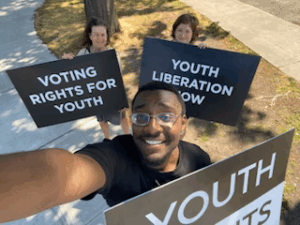In early November, NYRA’s project, the Community Alliance for the Ethical Treatment of Youth were invited to speak at the North Carolina conference of the Independent Educational Consultants Association (IECA). IECA is a trade organization representing educational consultants, many of whom refer parents (and their teens) to abusive behavior modification programs. These referrals constitute a major pipeline into dangerous, abusive and emotionally destructive programs. Despite their unusually hostile reception, it is admirable they invited CAFETY to their conference.
Reports indicate the debate was one of the most discussed and highest profile events of their conference. It was definitely an event that put CAFETY and all of us opponents of abusive behavior modification programs on the radar of educational consultants. For those interested in it, IECA described the debate.
One of the most interesting parts of the debate centered on the question of the age of medical consent. Washington state requires that all individuals 13 and up consent to medical treatment. This law, as best we can tell, has had a major impact on reducing or eliminating abusive programs in Washington state and limiting the number of Washington state youth sent to programs in other states. As people debate the benefits of regulating the residential treatment industry (especially with HR 911 on the table), medical consent is a law that NYRA, CAFETY and others have thought of as an ideal, youth rights-centered way to reduce or eliminate the harm of the troubled teen industry. I am glad to see it be a major topic of discussion at the IECA conference.
Obviously this idea wasn’t discussed without some controversy or opposition. One member of the panel, Lon Woodbury, an educational consultant and well known advocate of teen behavior modification, was especially critical of the idea of medical consent. He followed up last month with an essay using teen brain research to blast the medical consent idea:
It is our job as a society to protect our children! Giving them rights before they are able to responsibly handle them does no service to children, especially those who like to “live on the edge.” We need to rethink the whole question of children’s rights in light of research on the functioning of the adolescent brain.
I am not in the least surprised to see Woodbury make an argument in defense of residential treatment using brain science. One common theme I’ve seen in my exposure to the residential treatment world is the tendency to invalidate one’s own experiences. Your views, your conceptions of yourself, your hopes and desires are declared wrong in a program. The only one who can tell you what is real or true is the program itself. NYRA board member and CAFETY President Brian Lombrowski talks about breaking kids down and building them up again from scratch in the program’s image.
This style of “treatment” flows quite naturally when your conception of youth is that they do not have the maturity, reasoning, or brain faculties to understand themselves, their lives and their desires. When you assume they are incapable of thinking for themselves or looking out for themselves it is easy for parents to conclude their kids are lying when they call home with tales of abuse. It is far easier as well for society to excuse abuse if it is done in the name of trying to help.
Our concept of “human” is that of a rational, sentient animal. When we picture youth as inherently irrational then we don’t fully regard them as human. When we don’t fully regard them as human than all manner of abuse and mistreatment will occur. Regardless of how benign our intentions may be.
It is very important for advocates in this field to stop and think about why the victims of this industry are all young. Surely adults have mental health issues and need treatment as well. Why aren’t they forced into similar abusive programs?
Because they have rights and the ability to consent.
The entire reason this industry exists is because young people have neither. The existence of the residential treatment industry is a symptom of our wider devaluation of young people and their capacity. I did not go to medical school but I understand treating symptoms is not the ideal way to address problems.
We could (and absolutely should) enact additional safeguards, oversight, and regulation of these programs (i.e. HR 911) but ultimately these changes won’t solve the problem. We can invent (and programs surely will) kinder/gentler ways to strip down one’s humanity, we can invent physical restraints that are less likely to cause death and injury, we can take the rough edges of the facilities we lock up our children in, but they will still be locked up.
The juvenile justice system was created to offer a kinder, more understanding alternative to adult jails. In many cases residential treatment positions itself as a kinder, more understanding alternative to the juvenile justice system. We can invent new alternative systems today, but have we really made much progress?
CAFETY board member, Dr. Charles Huffine, MD takes issue with Woodbury’s interpretation of brain science:
It is not just Woodbury, there seems to be gross misunderstanding of how to interpret the research. I want you all to keep in mind that the frontal lobe immaturity shows up in high emotive situations! That is why juvenile crime is adjudicated differently – most crimes by juveniles are committed in a state of fear, excitement, being overwhelmed, shame, anxiety, etc. In calm circumstances the data shows that youth at least by 14 can make as valid a consent as an 18 yr old or 25 yr. old.
Dr. Huffine is correct. Youth DO have the ability to consent and understand their decisions. Will they always make the right decisions? Of course not. Neither do adults. Yet somehow our society survives allowing adults to make wrong decisions. Even though, as parents & bread winners, their poor decisions have far more of an impact on others than the decisions of teens.
I think though that most youth, most of the time, will make mostly good decisions. The same as adults. I think that is the most we can or should hope for. As Dr. Huffine said, science does suggest that. In fact I have a study that examines youth (some of whom are quite young) who make competent, mature end-of-life choices. I can’t imagine a more stressful, important decision a person could make than one involving their own death. It is worth a read.
Social values precede and inform the science that we do regarding young people. Our social values do not regard young people very highly. This has an enormous impact on research, and an even bigger impact on our understanding of that research. Research done on women or blacks in the 1890s is far different than research done today. I’m sure we are all aware that homosexuality was considered a disorder by the AMA for some time.
These social values which limit our understanding of youth not only cause us to restrict their ability to make decisions, they cause us to restrict the information that allows them to make decisions. The alcohol issue makes this problem plain. Due to our much vaunted research we have determined that young people cannot responsibly handle alcohol. So not only do we pass laws that stop them from drinking, we restrict their ability to learn about drinking. Our only official form of alcohol education is based on stirring up fear over how deadly, dangerous and harmful alcohol is and instructing youth to stay away. Now, after taking away all balanced, useful information through abstinence-only education we confirm our poor impressions of youth decision making when they do, in fact, make poor, uninformed decisions. Thus we feel more confident in their inability to make sound decisions and the cycle continues.
Our ability to understand what young people truly want and need is colored by many factors and is far from perfect. Instead of asserting that we know what is best for youth and invalidate the thoughts and feelings of youth like so many programs we oppose, we should trust them as people, as humans, and as equals to make the soundest decisions possible with the information they have at hand. Our role therefore should be to give them all the information available and all the honest support, understanding and friendship they desire to help them make quality decisions.






One Comment